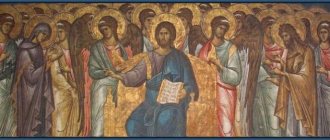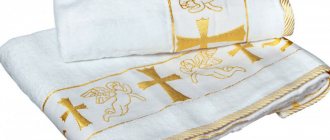Preparing a child for communion
How to prepare for your child's first communion? The sacrament requires adherence to strict rules in preparation. They are necessary for the complete purification of the human soul. However, it is difficult for children to comply with the necessary restrictions, so the rules for preparing for the sacrament are much weaker for them:
- Feeding. If the person receiving communion is an infant, it is recommended to feed him no later than 2 hours before the start of the sacrament. Older children should not eat during the day before communion. In this case, you should begin preparing for the sacrament in advance. In order for the child’s body to calmly withstand forced fasting, it is necessary to prepare it in advance.
- The first communion after the baptism of a child is the most important sacrament of Orthodoxy. During it, loud conversations, noise, and running are unacceptable. The child should be informed in advance about the basic rules of behavior.
- During the sacrament, the child and the adult who is holding the communion baby in their arms must wear a pectoral cross.
First Communion after Baptism
It is recommended to baptize and give communion to children from the moment of birth. The sooner the soul opens to the Lord, the easier and more successful life will be. The soul of a child, protected by angels, will not be involved in sinful acts.
The first communion after baptism is a whole event not only for the child, but also for his spiritual parents. During the sacrament, his soul will first open to heavenly powers. What do parents need to know about the timing of communion? It goes away after the child has been baptized. If the baby is still too young, many parents prefer to neglect the sacrament of communion or postpone it to a later date. The Orthodox Church does not approve of such behavior.
According to the rules established by the clergy, the communion of infants after baptism is carried out on the second day. Postponing it to a later date is highly not recommended.
How long does a participle last?
- The duration of the communion itself will depend on the number of those eager to receive communion.
- After the end of the service, the priest takes out the Chalice with the Holy Gifts from behind the altar and invites those who wish to receive communion.
- First, church ministers and monks receive communion, and then children and everyone else are allowed through.
- While waiting for your turn, you cannot arrange a farce and showdown, otherwise all repentance will not make any sense.
- To taste the Holy Gifts (“Cahors”, prosphora, holy water or “warmth”), it will take less than a minute.
How to take Communion in church
Many have heard about this ritual, but not everyone knows how to prepare for communion in church. This ritual involves the transformation of the body and the shock of the soul. First of all:
- it is necessary to treat this event reverently and consciously,
- sincerely believe in Christ,
- understand the meaning of the sacrament,
- you need to understand your unworthiness to accept such a great gift,
- there must be peace in the soul (forgive everyone and get along),
- It is advisable to first read such prayers as “Following to Holy Communion”,
- After the ceremony, you must read “Prayers of Thanksgiving for Holy Communion.”
In addition to the listed points, it is necessary to remember that the best way to cleanse your body and soul before accepting the Body and Blood of the Lord is fasting and confession.
The sacrament itself is performed in the church at a service called the liturgy. Mostly it takes place in the first half of the day. To find out more precisely about the time and day of the event, you should check with the temple you have chosen.
How long does Communion last?
Basically, the liturgy begins between seven and ten o'clock. The duration depends on the nature of the service, as well as on the number of people receiving communion. It can last from an hour and a half to 5 hours. Those who are preparing for communion should be at the service from the beginning, and are also recommended to attend the evening service, which is considered to be preparation for the liturgy and the rite of communion itself.
The best article for you, go to: Is it possible to read mantras to Orthodox Christians?
On what days is communion? In cathedrals and monasteries, liturgies are celebrated daily, but in parish churches this action occurs mainly on Sundays or church holidays.
How does the sacrament work?
You can come to the evening service the day before and read certain prayers. On the day of this ceremony, you should come to the temple earlier. During the liturgy, you should not leave the temple. Participate in the reading of prayers until the priest comes out from behind the altar with a chalice and calls everyone to communion. After that, everyone should line up. Children come first, then the infirm, then men and then women.
The process of performing the sacrament
How is it carried out after? Parishioners stand in line. Babies should be held by their parents. Adult children stand on their own. They need to fold their arms crosswise across their chest. In this case, the right hand should be at the top.
During the sacrament, a divine service takes place. During prayer requests, the clergy bring a Chalice with sacred wine and special consecrated bread to the middle of the temple. They symbolize the blood and flesh of Jesus Christ, who took upon himself all human sins. A special service is held over the Chalice, during which divine grace descends on those praying.
Read also: What happens if you eat rice every day
Believers take turns approaching the clergyman and asking for his blessing. When approaching the priest, you should name the Christian name given at baptism. After the clergyman completes the blessing ceremony, you must approach the sacred Chalice, drink wine and eat bread. In this case, it is necessary to ensure that there are no drops or crumbs. Children should be taught that divine gifts should be eaten completely. If a child spills wine, you should tell the priest about it.
After the communion after baptism is completed, the child is brought to a table with prosphoras and given to him to eat one of them. You can also wash down the gifts of the sacrament there. After this, you can take the child to the icons and show how to pray.
Do children need to be prepared for communion?
If a child who has undergone baptism is under seven years old, he does not need special preparation for the sacrament of communion. According to church concepts, such an age is considered infantile, not burdened with any serious sins. There is also no need for confession. For the reason already mentioned, only 7-year-old lay people can begin it.
Infants who receive communion after the baptismal rite do not have to be brought to the chalice with the blood of Christ on an empty stomach (it is recommended to feed babies 2 hours before the sacred action). The rule requiring temporary abstinence from eating (fasting) applies only to adults and lay people over seven years of age.
Older children preparing to receive communion after baptism must take part in the confessional ritual. This involves a conversation with a priest about your unseemly actions, sincere repentance for them and a promise before the face of the Lord not to commit similar acts in the future. Before communion, it is imperative to observe the morning and evening rules, to read, in addition to daily prayers, special prayer texts (the prayer of St. John of Damascus, the prayer of St. John Chrysostom). On the eve of communion, adults should attend church services with their child.
How do adults prepare for communion?
Preparation for the Eucharist should begin several days before it is celebrated. A person who intends to receive communion in a proper manner must first observe sincere repentance and humility, acquire a desire to improve and lead a pious lifestyle. To do this, you need to eat lean food, pray with great zeal, and attend evening worship on the eve of the day of Communion for confession.
In the process of preparing for the sacrament of Communion, it is important:
- deeply aware of one's own sinfulness;
- beware of manifestations of anger and condemnation;
- suppress depraved thoughts and abusive speech;
- avoid visiting entertainment venues;
- devote time to reading spiritual literature;
- in anticipation of giving up intimate relationships;
- after midnight before the sacrament, do not eat, drink, or smoke.
Fast
Together with prayers, it is better to combine fasting, lasting from 1 to 3 days, which involves abstinence from indecent food: meat and dairy dishes, butter, eggs.
During strict fasting, you should not eat fish dishes and adhere to moderation in food and drink.
Confession
A strict condition for the implementation of Communion is Confession, performed the day before or in the morning before the Liturgy. Before confession, it is necessary to make peace with the offenders and the offended, and ask for forgiveness with humility and awareness. During the process of confession, one must sincerely repent of the sins and deeds committed.
Prayer
Preparation for communion is inevitably accompanied by fervent prayers and reading the penitential canon to our Lord Jesus Christ, the prayer canon to the Most Holy Theotokos, as well as the canon to the Guardian Angel, the canon to Holy Communion and the following to Holy Communion.
What wine is used when performing the sacrament?
Often, when parents ask questions about how babies are given communion in church, there is an interest in the type of wine. This is really important, since this drink, even when diluted, can cause an allergic reaction in a newborn.
As a rule, in most Russian churches, fortified dessert wines made from red grape varieties, for example, Cahors, are used to celebrate the sacrament of communion. However, the use of just such wines is not at all an unshakable rule.
Each locality has its own traditions of what wine will symbolize the blood of the Lord during the sacred rite. For example, in Greek churches they often give communion to parishioners with white wines or a mixture of them with red ones, while in Georgia “Zedashe” is traditionally used.
Accordingly, those parents who, for some personal reason, need to know what communion is given to babies in church should talk with the priest serving in the church where they plan to share the sacrament with their baby. There is no need to be shy about asking questions to clergy, especially if they are dictated not by idle curiosity, but by fears or doubts.
Read also: Pitch, timbre and volume
How is the ceremony carried out in the church?
The Sacrament of Communion is celebrated every Sunday in all churches. And in places of service of more than one priest - every day, except for special days of the Church Charter. The ritual takes place after the Liturgy, held in the morning. At the end of the singing of the Lord's Prayer and the closing of the Royal Doors, a line forms at the altar. Children and parents with babies are allowed forward - they receive communion first.
When celebrating the Eucharist, some simple rules should be followed:
- When the priest takes out the chalice and after reading 2 prayers, you should cross yourself, cross your arms to your shoulders so that the right hand is on the left shoulder and the left hand is on the right, approach and take communion without lowering your hands.
- You shouldn’t cross yourself near the bowl so as not to accidentally touch it.
- At the moment of the ceremony, you must say your own name in Baptism, open your mouth wide for the priest to insert a spoon with the Body and Blood, after which you should swallow them, kiss the cup, step away and cross yourself.
- Next, you should go to the table with a “drink” to wash down and eat a piece of prosphora with the Communion to avoid ejection.
- You should not leave the temple before the end of the service in order to listen to the prayers of thanksgiving or read them at home.
On the day of the sacrament, you should refrain from entertainment, behave piously, devote the rest of the day to pleasant communication with loved ones, reading spiritual literature, and quiet walks.
Baptism in Merkushino
After Baptism, in the coming days, the newly baptized must begin the Sacrament of Communion. The Sacrament of Holy Communion occurs during the Divine Liturgy. You can come to the Liturgy at any Orthodox church (closer to home or closer to you in spirit).
HOW TO PREPARE FOR HOLY COMMUNION
You must prepare yourself for the Sacrament of Holy Communion through prayer, fasting and repentance. In addition, it is very important to remember that preparation for Communion should not only be the fulfillment of certain instructions, but our entire life, built on Gospel principles. It is necessary not only to comply with disciplinary regulations, but to thirst for Christ, with all the strength of the soul to desire union with Him.
Prayer at home and church.
There is home and church prayer. Anyone who wishes to partake of the Holy Mysteries of Christ must prayerfully prepare himself for this: pray more and more diligently at home, attend church services. On the eve of communion, it is customary to attend evening church services. For prayer preparation for Holy Communion on the eve of communion, you need to read:
— Follow-up to Holy Communion. It is in the Orthodox prayer book. There is, in addition, a pious tradition (but not an obligation) of reading three canons and akathists before receiving the Holy Mysteries of Christ:
- the canon of repentance to our Lord Jesus Christ,
– canon of prayer to the Most Holy Theotokos,
– canon to the Guardian Angel. (On the days of celebrating the Resurrection of Christ (40 days), instead of these canons, it is usually blessed to read the Easter canon). If a person wants to read canons and akathists and has time for this, then such reading can bring nothing but benefit.
Fast
Before Communion there is a liturgical fast. For newcomers who have fallen away and who have not observed the multi-day and one-day fasts established by the Church, the priest may establish an additional 3-day fast before Communion. Fasting, in addition to food restrictions, also consists of eating and drinking less than usual, and also refraining from visiting the theater, watching entertaining films and programs, and listening to secular music. It is necessary to maintain bodily and mental purity. Spouses should abstain from physical contact on the day before and after communion. On the eve of communion, from 12 o'clock at night, a strict fast begins - complete abstinence from drinking and food (in the morning, going to church for communion, you are not allowed to eat or drink anything; those suffering from tobacco addiction must also abstain from their passion).
Mood and behavior
Those preparing for Holy Communion must make peace with everyone and protect themselves from feelings of anger and irritation, refrain from condemnation and all indecent thoughts and conversations, spending time, as far as possible, in solitude, reading the Word of God (Gospel) and books of spiritual content.
Confession
Those who wish to receive communion must, on the eve, before or after the evening service, verbally confess their sins to God in the presence of a witness - a priest, sincerely opening their soul and not hiding a single sin they have committed and have a sincere intention to correct themselves.
Before confession, you must certainly reconcile with both the offenders and the offended, humbly asking everyone for forgiveness. The task of preparing for confession is to find specific qualities of your soul, character traits, actions, events or conditions that violate the Commandments of God, preventing communication with God. During confession, it is better not to wait for the priest’s questions, but to tell him everything that weighs on your soul, without justifying yourself in anything and without shifting the blame to others. It is more correct to confess in the evening on the eve of communion in order to participate in the liturgy in the morning. Without confession, no one can be admitted to Holy Communion, except for children under 7 years of age and in cases of mortal danger. Before Holy Communion and during Holy Communion Even before the opening of the royal doors and the removal of the Holy Gifts, it is best soon after singing “Our Father,” you need to approach the altar and wait for the removal of the Holy Gifts with the exclamation “With the fear of God and faith, approach " In this case, it is necessary to let the children who receive communion first go ahead, before the adults. When approaching the Chalice, you need to bow in advance, from afar, and fold your arms crosswise on your chest (right over left). There is no need to cross yourself in front of the Holy Chalice, so as not to accidentally push it. Approaching the Chalice, you need to clearly pronounce your full Christian name, open your lips (mouth) wide and reverently, with full consciousness of the holiness of the great Sacrament, accept the Body and Blood of Christ and immediately swallow. After Holy Communion, having received the Holy Mysteries, without crossing yourself, kissed the edge of the Chalice and immediately went to the table to taste a particle of antidor and wash it down with warmth. It is not customary to leave the church before kissing the altar cross in the hands of a priest. After this, you need to listen to prayers of gratitude (or read them when you come home). On the day of Holy Communion - behave reverently and decorously, in order to “honestly keep Christ accepted within you”
How often can you receive communion?
This is a rather controversial question. Rather, it is not the frequency that is important, but the “quality” of communion, the person’s awareness of the importance of what is happening. If such awareness is always present, then you can take communion as often as possible, even every week.
- Orthodox Christians are recommended to experience the sacrament of communion two to three times a month.
- People who are preparing to devote their lives to the church can receive communion more often, then mental and physical fasting can be slightly weakened for one or two days.
- This can also be done before each post - four times a year.
- It is strictly forbidden to receive communion twice in one day.
Thanks to the church, human spirituality is revived. If you feel a burden in your soul, start attending just the liturgy, without communion. Talk to the Holy Father, perhaps you will find answers and find peace. When your consciousness itself comes to the desire to confess and take communion, you will feel it.
What is Communion
The history of the origin of the rite of Communion in the Orthodox Church dates back to the Last Supper. It was established by Christ himself. It was he who broke and served the bread to his disciples, calling it his body, and calling the wine his blood. Thus, during the sacrament of communion, the unity between creation and the nature of the Creator, which existed even before the Fall, is restored. The result of communion is considered to be the gift of embryos of future life in the Heavenly
Kingdom. The mysticism of this ritual lies in the Savior’s sacrifice. He crucified His Body and shed His Blood on the Cross. Jesus sacrificed himself before the Creator for us to restore fallen human nature. And we, by taking part in this ritual, also help such restoration. Eating Flesh and Blood during Communion is quite possible. This is a symbolic frame of wine and blood.
Under the outer shell of perishable matter hides the incorruptible means of the Divine nature. Communion is the name given to the “nutrition” of the soul, which must occur after its “birth” in the Sacrament of Baptism. Baptism should be done once in a lifetime, but Communion should be done at least once a month. At a minimum, such a ritual can be performed once a year, but this can lead to the survival of the soul.
The best article for you, go to: Is it possible to pray during menstruation
Is it necessary to give communion to children? At what age should this be done?
There is a very widespread misconception that baptized babies must be given communion. This is not true at all. The sacrament of baptism does not impose an obligation on the parents of the child to bring him to the Eucharist. There are no regulations or decrees regulating the age at which infants receive communion in church. The decision on the participation of a newborn in the sacrament is made by the parents of the child. The priest can only explain to them the meaning of the rite of communion and tell them why they need to participate in it. A clergyman cannot force a person to take the Eucharist.
In pre-revolutionary times, when religion was an integral part of the life of every Russian, questions about when and how infants received communion after baptism and whether this should be done were not relevant. People came to church services, of course, young mothers had children in their arms. At the end of the prayers, all parishioners lined up for communion. Accordingly, the priest gave communion to both the child and his mother, as well as other people present in the temple.
That is, questions about the age at which infants receive communion did not arise, because the Eucharist was a traditional, integral and natural part of life. Newborn children who had been baptized received communion together with their mothers. Of course, there was no schedule for the frequency of participles either. At least once a week, on Sundays, newborns participated in the Eucharist, of course, if their parents attended the service.
In modern conditions, not all parents can afford to attend Sunday services every week. Not everyone understands why infants should receive communion. Church ministers do not oblige parents of newborns to participate in the sacrament. Even if the baby is in the arms of his father or mother, only adults can receive communion. Moreover, you don’t have to get up for communion at all. But when refusing to participate in the Eucharist with a child, we should not forget that a person’s habits are formed in his earliest childhood, when he is just beginning to learn about the world.
Fasting of an adult after christening
Retreat is a certain preparation for the Eucharist, consisting of reading certain prayers, fasting and repentance.
To speak correctly, you must follow the following rules:
- Healthy people and non-pregnant women should eat in moderation and fast, which involves excluding meat and dairy products and eggs from the diet.
- During fasting, read out the morning and evening prayer rules with attention and diligence.
- Study spiritual literature that is valuable for preparing for repentance.
- Refusal of entertainment and going to noisy places.
- It is more correct to read the canon of repentance to the Lord Jesus Christ, the canons to the Mother of God and the Guardian Angel, and the Rule for Communion during these 3 days.
- Reach agreement with the offended and offenders.
- It is necessary to confess in church at an evening service - All-Night Vigil or at morning Confession.
- Avoid eating and drinking after midnight and before the morning Liturgy.
Retreat is an integral part of the life of a Christian, necessarily preceding the sacrament of Communion.
Baptism is the door to the Church
Through the Sacrament of Baptism a person becomes a member of the Church of Christ. This is the first Sacrament with which the spiritual life of a Christian begins. In a conversation with Nicodemus, Jesus Christ reveals the importance of Baptism:
“Truly, truly, I say to you, unless one is born of water and the Spirit, he cannot enter the kingdom of God. That which is born of the flesh is flesh, and that which is born of the Spirit is spirit” (John 3:3-6).
Archpriest Seraphim Slobodskaya in his book “The Law of God” points out that the Sacrament of Baptism was established by our Lord Jesus Christ Himself, having been baptized by John the Baptist in the Jordan River. He commanded His disciples: “Go and teach all nations, baptizing them in the name of the Father and the Son and the Holy Spirit” (Matthew 28:19), thereby calling on the apostles to baptize the people who believed in Him.
What is needed for a baby's baptism
What to take with you to your baby's christening
Preparation for the ceremony also includes collecting things for the sacrament. When baptizing your baby you need to take with you:
- Cross for a child. It is believed that it should be given as a christening gift by the future godfather. A silver cross is suitable for a baby, which, according to signs, will protect him from the evil eye.
- Special shirt or dress. Today, children's stores sell many different options for baptismal shirts and dresses. You can sew this outfit yourself. According to tradition, it should be given to the baby by the future godmother.
- Kryzhma or towel. The child is wrapped in it after the bath. According to popular belief, such a towel cannot be washed after baptism. If a child is sick, then he needs to be covered with kryzhma.
- Birth certificate of the baby and parents' passports.
- A blanket to change your baby on.
- A bag in which a cut strand of hair is placed during the sacrament.
- Things the baby needs, such as diapers, pacifiers, wet wipes, etc.
- Money. It is better to discuss the cost of the ceremony and other financial issues in advance with the priest performing the sacrament.
How to dress a baby for baptism
When choosing a christening shirt for a baby, you should give preference to soft, comfortable and natural outfits.
It is better if the chosen clothing allows easy access to the baby’s body. Clothing can be light colors or white. When deciding how to dress a baby for baptism, you should also take into account the time of year when the ceremony takes place and the temperature in the church where the child will be baptized.
Adults who are going to be present at the baptism of a baby should also pay attention to their clothing. There is no need to choose overly festive attire. Women, and especially godmothers, should wear a skirt or dress of sufficient length and cover their head with a scarf or headscarf. For men, it is better to choose a strict, classic version of clothing, for example, trousers and a shirt.
Confession and communion for children
Preparing for Children's Communion
In the Catholic Church, a child's first communion is a real holiday. They are carefully preparing for this. But in time it happens much later than among the Orthodox.
In the Orthodox Church, infants receive communion at a very early age, immediately after the Sacrament of Baptism. Young children do not require special preparation for Communion. Infants can be given communion without an empty stomach; feeding them beforehand is not prohibited.
As the child grows, you should try to give him communion on an empty stomach.
But there is no specific measure of age for this; everyone has different degrees of endurance and maturation. But if the baby is capricious and asks for food, of course, there is no need to torture him and you should feed him before communion
. Otherwise, he may begin to hate the Sacrament and the Church itself.
Do I need to stay with my child for the entire service?
The child must be brought directly to Communion so that he does not disturb those praying with his cries or disturb the prayer atmosphere in the church. It is best to come with children after singing the Lord's Prayer.
Babies who do not have teeth are given Holy Communion only with Blood, since they cannot chew and swallow the Body of Christ. But adult children can already receive Communion with the Body. Therefore, there is no need to bring babies
. And those children who already have teeth and are able to swallow hard food can be given Holy Communion with the Presanctified Gifts. Each child has a different age.
What is the sacrament of Communion for children?
As children grow older, parents need to explain what Communion is. never tell your child that this is sweet water.
as some do. This way he will develop an incorrect understanding of the Sacrament.
If a child screams and refuses to take Communion, he should not be given Communion forcibly, against his will. Usually it is held tightly and Communion is poured into the mouth. This behavior is very dangerous both from a mental and physical point of view; the child may choke. And the unpleasant impression of the Sacrament will remain in his memory for a long time. You can simply leave the church with your baby, try to calm him down, and then try to give him communion.
After communion
After Communion, it is advisable to give the child a drink; an older person can be given prosphora.
What not to do after Communion:
· give the child a pacifier or breast immediately;
· forcefully pour in the drink;
· shake the baby (he may vomit).
If suddenly the child burps or spits out after Communion
, you need to carefully collect it in a scarf and then burn it. If there is a mark on clothing, it is advisable to burn it too. Therefore, it is better to put a bib on the baby before Communion (it is easier to destroy it later).
Confession of children
For children under seven years of age, the church charter prescribes communion without confession. But after reaching this age, the child must confess before Communion. It is better to prepare your baby for this important event in advance. We need to explain to him what the essence of the Sacrament is, to help him remember his sins. If a child can write (at least in print), it is better to write down sins on paper. This will make it easier for him, because children often get nervous during confession and find it difficult to say something. But usually the priest asks leading questions in this case.











